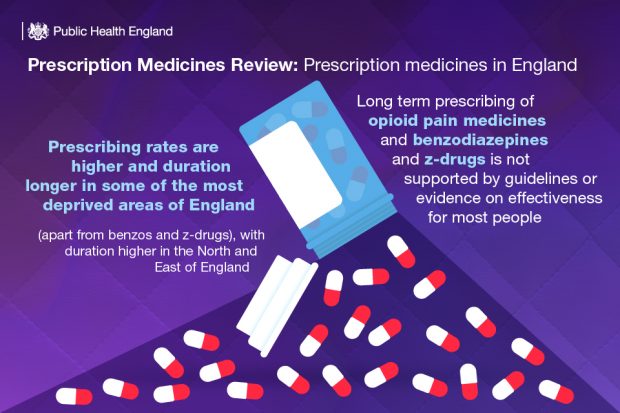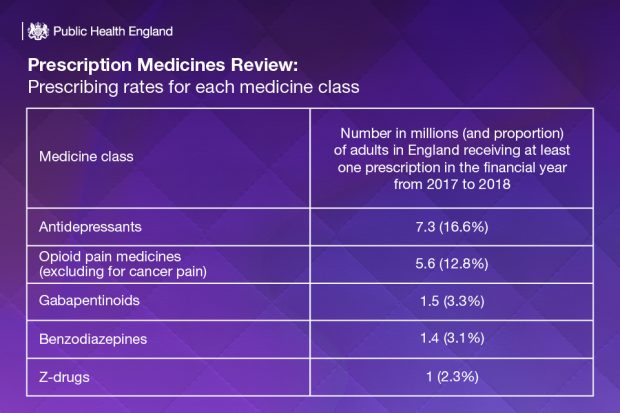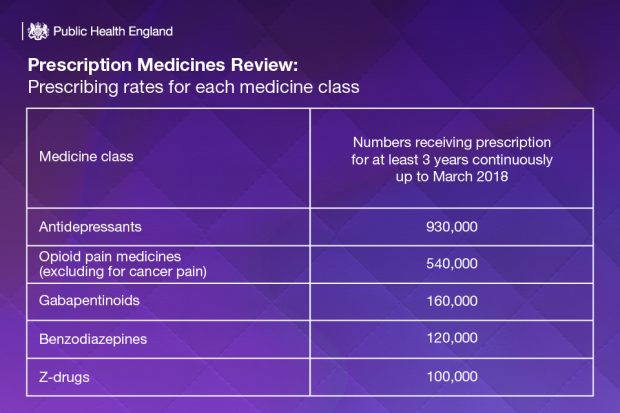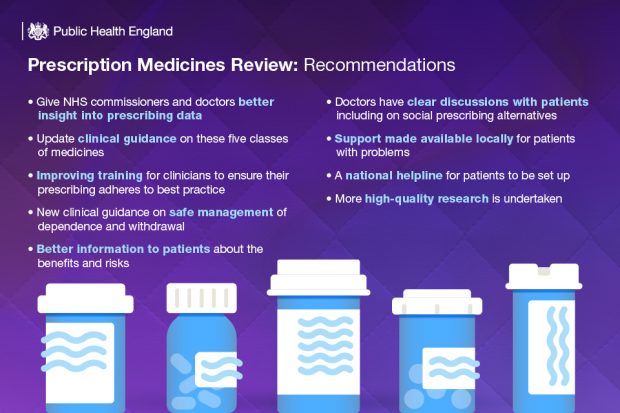
The first ever evidence review of dependence and withdrawal problems associated with prescription medicines assesses the scale and distribution of the issue and outlines how to ensure people can benefit from the relevant medicines when they are needed, whilst limiting any harms caused by dependence or withdrawal. Find out more in this blog about what this means for patients and what needs to be done.
In response to concerns raised by patients about prescription rates in England and in the context of the opioid crisis in North America, we were asked by the public health minister to review the evidence on dependence and withdrawal problems associated with five classes of prescription medicines in England:
- antidepressants
- opioids (for chronic pain)
- gabapentinoids
- benzodiazepines
- Z-drugs
The review in numbers
It was found that in 2017-18, one in four adults (11.5 million) were prescribed at least one medicine from these classes. This is broken down by medicine class below:

Around half of people who were receiving a prescription in March 2018 had been receiving their prescription continuously for at least 12 months, with higher proportions with longer prescriptions in some of the most deprived areas. When we looked back to 2015, the data reveals that a significant number of people were still receiving their prescription three years later in 2018. This is broken down by medicine class below:

What the review reveals about the current situation in England
There are limitations to what we can say from the available data. We cannot determine the exact number of people dependent on prescription medicines. However, with the amount of people receiving their prescriptions for longer than recommended we can conclude that dependence and withdrawal are likely to be significant issues in England. This is made particularly apparent when considered alongside concerns raised by patients and carers on the harmful side effects and withdrawal symptoms they have experienced that have affected many aspects of their lives.
Guidelines recommend that opioid pain medications and benzodiazepines should be prescribed for short-term treatment of acute conditions. Our review shows that many millions of people are given these medicines well beyond this, risking dependence and requiring careful medical support when they decide to stop.
The situation is different with antidepressants. Many people with depression need to take these medicines for several weeks before they start to help, and many will need to continue taking them long-term. But we must not ignore reports of patients who have experienced severe side-effects from taking antidepressants.
Nobody who has a long-term prescription should stop abruptly – they will need careful medical help to slowly withdraw.
Some patients who have experienced problems associated with withdrawal and dependence have said that their prescriptions were insufficiently reviewed by doctors and that they had trouble finding support. There was also a lack of information on the risks of withdrawal and dependence the medicines can cause, and patients were often not offered other treatment options.
Next steps
In England, our current situation with opioids does not compare to the health crisis in North America – but our review shows that the risk of dependence and withdrawal problems associated with these medicines demand immediate action.
Better support, regular reviews of prescriptions and alternative treatments to medication-alone are all needed to tackle the problem.
We have made recommendations for different areas of the healthcare system to help those experiencing problems and prevent withdrawal problems or dependence. Our recommendations can be found below:

Across the nation, the public need to be made aware of the risks associated with the prescription medicines included in this review and the alternative treatments that are available, including exercise and cognitive behavioural therapy.
Doctors should also be provided with up-to-date guidelines, training and support to ensure effective prevention and treatment approaches are employed when considering medicines that may cause dependence or withdrawal symptoms.
At a local level, prescriptions need to be regularly reviewed and monitored. Publishing accurate data will help local areas identify where they might have problems and provide the push to make appropriate treatment and support available.
At an individual level, doctors need to make sure that they are providing patients with accurate information so that they can make informed decisions about their treatment. This includes information on the risks and benefits of their medication and what other treatment options are available. It is really important that doctors do not inappropriately limit medicines, as this may increase harm, including the risk of suicide, and lead some people to seek medicines from illicit or less-regulated sources. For people experiencing problems with dependence or withdrawal, doctors should be aware of locally available support.
These recommendations are just the beginning of the way forward. The strategic leadership of Clinical Commissioning Groups (CCGs), integrated care systems (ICS) and sustainability and transformation partnerships (STPs) will be vital to implementing our suggestions. We plan to work over the next year with representatives from the organisations that we have made recommendations for, to support their implementation and then establish a working group to take the agenda forwards.

2 comments
Comment by Sandra Teale posted on
I am so encouraged by this review. I was prescribed benzodiazepines at 14 yrs old in 1976 and wasn't told until 1989 that the side effects I had been thinking were 'my diseased body/mind ' was actually the side effects of the medication. I went on to meet many others who were and have had awful side effects coming off benzodiazepines and/or antidepressants. Any review on the prescribing of these medications is overdue but very welcome.
Comment by Barry Haslam. posted on
It is now high time that this country provided a national network of safe dedicated withdrawal centres and after care facilities, for those patients who have become dependent on drugs as prescribed by their doctors. Substance Misuse Units are NOT the answer. Benzodiazepine drugs where first marketed in the UK in 1960 Librium, 1962 Valium and 1972 Ativan. Why are there still no dedicated withdrawal centres to safely treat these iatrogenic dependent patients, more than half a century after first being marketed ? Benzodiazepines where known to cause dependency in patients in the 1960/70s, even in therapeutic dosages. The Committee on Safety of Medicines issued a Report on benzodiazepines in 1988 stating that these drugs where only to be prescribed for 2 to 4 weeks only. So why have doctors and other prescribers been allowed to get away with prescribing these very dependence forming set of drugs for decades and in 1 case i know of more than 40 years ? There is also a clear lack of research being undertaken into long term health implications of ingesting these drugs. We know from past research papers that benzodiazepines have led to an increased risk of developing Alzheimer's disease, brain damage and lung cancer. So finally, Public Health England are seemingly now active on this " Medical disaster" as called by Professor C. Heather Ashton, a world renown expert on these drugs. For many patients whose lives have been wrecked by these prescribed drugs, this PHE Review will be far too little and far too late BUT if it stops the flow of new patients becoming dependent on these drugs, and the misery this causes then it will have served it's purpose. We still have hundreds of thousands of patients who have long term dependency problems on benzodiazepines and z drugs. Public Health England owe them a duty of care and for those patients who have been prescribed these drugs long term, PHE owe them the decency to maintain them on these drugs, if the patient so wishes. David Blunkett MP ( now Lord Blunkett ) described the benzodiazepine prescribed drug situation in 1994 as " A national scandal". What we urgently need, is an Independent Public Inquiry into the last 50 years of this prescribed benzodiazepine medical disaster and national scandal, where witnesses are questioned under Oath and the truth revealed to the damaged victims and their families of these prescribed drugs.